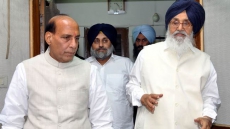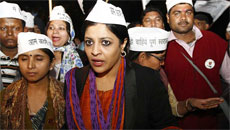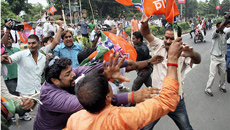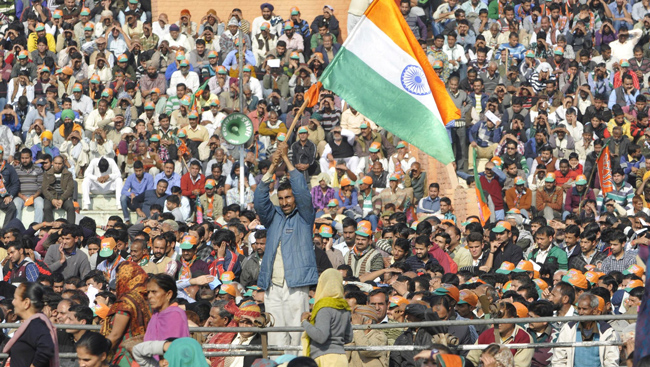The seven-nation Bay of Bengal Initiative for Multi-Sectoral Technical and Economic Cooperation should hold special significance for Prime Minister Manmohan Singh as he returned to New Delhi Tuesday from its third summit over two days in Myanmar's spanking new capital of Nay Pyi Taw.
It was with the first summit of BIMSTEC, as the regional grouping is abbreviated, in Bangkok in July 2004 that he began his first overseas visit as prime minister after taking over the reins two months before. It was again at this forum's summit that he marked what would, perhaps, be his last official overseas visit as India's premier.
In the interim, he himself played host to its leaders at the second summit in New Delhi in November 2008, resulting in his attendance at all the three apex-level engagements this forum has seen thus far.
Having travelled far and wide during his two terms as prime minister and having earned more praise as an economist-statesman overseas than within his country, the forum that marked his entry to the high table of global geopolitics should have an added significance.
But on a more serious note, the regional forum should hold much importance for Manmohan Singh, as also for the high hopes it today raises to significantly address the demands and aspirations of the people of India's eight northeastern states, who often complain of neglect by New Delhi.
He should know this better as it was from Assam that he was first elected to parliament in 1991 as a member of the Rajya Sabha, the upper house, and went on to win four more terms in 1995, 2001, 2007 and 2013, which should last till 2019 - beyond his current tenure as prime minister.

Each of these eight states - Sikkim, Assam, Meghalaya, Tripura, Mizoram, Manipur, Nagaland and Arunachal Pradesh - shares a land boundary with one or more of the forum's members, comprising India, Nepal, Bhutan, Bangladesh, Myanmar, Thailand and Sri Lanka.
The development of land routes alone can significantly connect these eight states - and India, in a larger context - with the rich and developing nations of East Asia, which has been a crucial factor in India's much-flaunted Look East policy.
BIMSTEC, in the past, had been unable to grab national media attention, as could another small regional grouping of which India is a member - the South Asian Association for Regional Cooperation - perhaps, due to Pakistan's absence.
So what raises that hope after its third summit, even as the potential of this club has remained huge, accounting for some 2.5 billion people, or 20 percent of world population, a collective national output valued at $2.5 trillion and a rich endowment of mineral wealth and clean energy potential?
For one, the grouping has now decided to set up a permanent secretariat in Dhaka with a seasoned Sri Lankan diplomat, Sumith Nakandala, who has served as a deputy high commissioner to India, as its first secretary general. India, true to its dominance, will foot 32 percent of its budget. This should give that much-needed institutional support for results.
Second, the leadership has sent a strong message to officials that they would like to see the proposed free trade accord to be operational by the year-end, which should now keep the negotiating committee on its toes.

They have also resolved to put in place the infrastructure required for road and transport connectivity among member-states and secured the support of the Asian Development Bank on this, which should open up borders to the larger 10-member ASEAN.
Also of significance is a plan of action to promote tourism and people-to-people exchanges, which is often a neglected factor while reporting on diplomacy but plays a meaningful role in bringing countries closer. It is for the people, after all, that nations engage bilaterally, regionally and multilaterally.
Apart from promoting regional development, all these are also key to addressing the other challenges India faces in that region, notably shelter for insurgents with or without state support, international terrorism, transnational organised crime and drug trafficking.
The fact that each of these seven member nations has embraced democracy, with encouragement and support to some from India - the world's largest on this count - should also stand the grouping in good wicket.
Finally, when some issues may seem daunting to resolve bilaterally, a regional forum such as BIMSTEC has presented a far greater opportunity, as its expands the scope of give and take, which is so crucial to diplomacy sans conflict.
It also offers a forum for one-on-one engagements among leaders without much of the encumbrances attached in producing results, which are otherwise deemed necessary during official bilateral visits to each other's countries.

A case point being Manmohan Singh's half-hour interaction with Sri Lankan President Mahinda Rajapaksa on the margins of the latest summit to discuss most of the issues of concern that could, perhaps, not have happened in Colombo or New Delhi given the current political undercurrents.
It would, therefore, be in order to conclude that as a leader who has attended all the three BIMSTEC summits and whose opinion has been sought, accepted and also acted upon, Manmohan Singh can view as accomplishments his contributions during the first and the last overseas engagement as prime minister.





